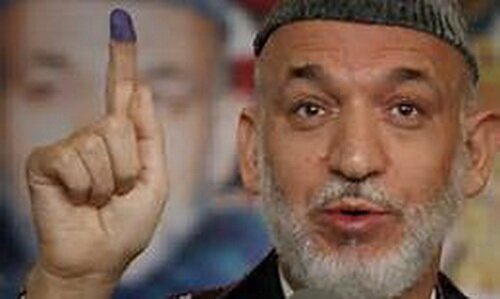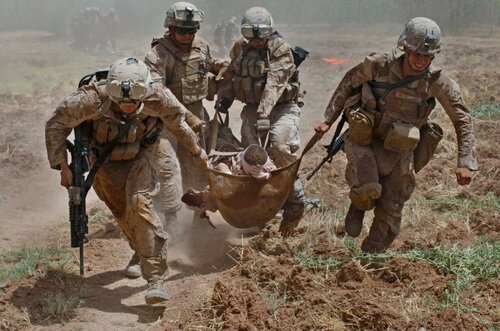
Vadym P. Volokhov, Middle East Programme Manager.
In Afghanistan unfolds a pretty fierce struggle for the presidency, in which are actively involved presidential candidates together with their alternates. The official date of its start is February 2. From this day it is officially allowed to conduct election meetings, to post pictures and posters, to distribute advertising through audio, video, print and electronic media, through social networks included. The elections themselves will be held on April 5.

The current President of Afghanistan Hamid Karzai
Presidential elections will be held simultaneously with the elections for provincial councils. Today we know the names of 11 presidential candidates and 22 candidates for vice-president (by the way, three of them are women). They all actually represent the entire political spectrum of modern Afghanistan, including mujahidins, Islamists, people close to the last Shah and technocrats who have returned from the West.
These elections must for the first time ensure a peaceful transition of power from one elected president to another.
Note: The first presidential elections in Afghanistan were held on 9 October 2004, when Hamid Karzai received 55.4 % of votes (three times more than the next candidate for the post). Three quarters out of the 12 million registered voters participated in the elections.
The second presidential elections in Afghanistan were held on 20 August 2009. Then there were about 17 million voters. The presidential elections were also combined with the elections to regional authorities.
For president claimed more than 30 people, including two women. The main contenders were the then President Hamid Karzai, former Foreign Minister Dr. Abdullah Abdullah and former Planning Minister, a deputy of the National Assembly Ramzan Bashardost.
The lections heated up the political situation in the country. The Taliban called on people to boycott them, warning in its leaflets that all those who voted would become enemies of Islam. Despite the safety measures taken before the elections, there were several terrorist attacks in Kabul and other cities of the country. And during the elections Talibs had made more than 70 attacks.
The alternative candidate Dr. Abdullah Abdullah withdrew his candidacy from the second round of the elections, and the sharp deterioration of the political situation and the threat of new terrorist attacks made the Election Commission decide to cancel the second round of voting. Hamid Karzai was recognized the elected President.
In accordance with the Constitution of Afghanistan, President Hamid Karzai who had been twice elected to the post of the president of the country, has no right to run for president again, and has to hand over power to some other person chosen by people's vote.
The experience of the past election campaigns in Afghanistan, showed that with the approaching date of the elections, most candidates come out of the election campaign in favor of one of the two or three important figures. It is assumed that at the upcoming presidential elections, out of 11 candidates only Abdullah Abdullah, Ashraf Ghani Ahmadzai, Abdul Qayum Karzai, Abdul Rasul Sayyaf, Gul Agha Sherzai and Zalmai Rassoul will continue to compete for the presidency.
Hamid Karzai himself is expected to support the close to him Zalmay Rassoul or Abdul Qayum Karzai. This is also evidenced by Hamid Karzai’s secret negotiations conducted in order to reduce the number of pro-government candidates for the presidency.
Results of the upcoming elections will be important for the future stability not only of Afghanistan, but of the entire region.
Today in Afghanistan there are staying around 55.000 foreign troops, of which 33.5 thousand — American servicemen. It is expected that, in accordance with agreements between NATO and the Afghanistan’s government, the bulk of foreign military forces will leave the country before the end of 2014, and the Afghan security forces will have to provide security themselves and to fight with the armed opposition, including with the Taliban.

NATO in Afghanistan
http://topwar.ru
Is not clear the fate of the Security Agreement between Afghanistan and the United States, according to which part of the American forces after the current mission is to remain in the country. Its signing was announced by the USA and NATO the main condition for continued support to 350 thousand Afghan Security Forces.
February 25 U.S. President B. Obama warned H. Karzai that Washington intends to fully withdraw its troops from Afghanistan, since the current government of Kabul is unwilling to sign this bilateral agreement. Obama has ordered the Pentagon to prepare plans for the withdrawal of the contingent of the USA's Armed Forces by the end of this year. If the Agreement is signed, Washington is ready to leave in Afghanistan “ten-thousand limited mission” of advisers and instructors, who will help the Afghanistan's Army in its struggle against “Al Qaeda” and other illegal armed groups.
President of Afghanistan Hamid Karzai said in response that he does not succumb to pressure and will not sign the Agreement until the United States have fulfilled his terms and conditions related to the practical start of peace negotiations with the Taliban and termination of the US Forces' operations in Afghan villages. He confirmed this in his interview published in the newspaper The Washington Post.
“My position remains the same: I cannot sign this Agreement with the United States without having started the peace process,” — said Karzai. He also highly criticized the relationship between Washington and Kabul. According to him, the U.S. military campaign, which began in late 2001, did not bring peace to Afghanistan. “U.S. forces have not reached the goal, for the sake of which they are said to be here,” — said the Afghanistan’s leader. In his view, the United States operate in Afghanistan, not for the sake of citizens of this country in Southwest Asia, but “for the sake of a cause dear to America itself”.
Karzai could not answer the question of whether the American war in Afghanistan was worth the efforts spent on it. “I cannot give a simple “yes” or “no” answer. It is very difficult. Perhaps I will be able to give such an answer in two or three years, in five years, when I am not so emotional,” — said the President.
When he was asked what signal he would send to Americans, Karzai said: “Give my best wishes and thanks to the people. And to the U.S. government — my anger, my most intense anger”.
The USA and NATO, in their turn, point out that they do not hope that this Agreement will be signed by Hamid Karzai. And so, insisting on holding free and transparent elections in Afghanistan, they stress that on this issue they are willing to negotiate with the country's new President.
According to NATO Secretary General A. Rasmussen, the presence of NATO forces in Afghanistan after 2014 is impossible without signing the Afghanistan-USA Agreement on security. He also stressed that, despite the fact that the complete withdrawal of foreign troops from Afghanistan is undesirable, but NATO forces will have to leave the country's territory due to the lack of legal framework for their further staying there.
So, uncertainty about the Afghanistan-USA Agreement on Security, the real threat to the security of the country from the Taliban, the government's not keeping' neutrality and repetition of massive fraud that occurred in the previous presidential elections, can significantly affect the development of the military-political situation in the country.






